Indian ambassador to Iraq B.B. Tyagi is a little loopy from jet lag, puffing away on nicotine to pump himself up. He's had to cut short his leave, fly back into Amman and then hop on a chartered flight to Baghdad to handle the kidnapping of the three Indian truck drivers—Antaryami, Tilak Raj and Sukdhev Singh—in Iraq. It's a constantly evolving situation. Iraq itself offers a menacing kaleidoscope. Then there are inputs coming in from the Indian embassy in Kuwait. And having to know how to squeeze something out of names like Sheikh Hisham al-Dulami is the final poser.
Sheikh Dulami, a tribal leader, has suddenly emerged as a person with some influence over the Holders of the Black Banners, from all accounts a gang from Mosul which kidnapped the three Indians, three Kenyans and an Egyptian. At the time of their abduction, these seven were driving the trucks of the Kuwait Gulf Link Transport Company (KWG) in Iraq. The Black Banners hadn't been heard of earlier; the group wasn't even aware that India and Egypt did not have troops in Iraq (their withdrawal was the group's initial demand for releasing hostages). Yet the Black Banners evolved its list of demands with great juvenile adroitness, and now hopes that the Sheikh would cut a deal for them.
In the end, it may turn out to be just about money. Just as it is for about 1,500 Indian truckers who brave RPG fire, landmines, and ambushes from disparate Iraqi radicals—former Baathists, jehadis, nationalists or plain kidnapping gangs—in a swathe of militant acreage extending from Abdaly in Kuwait all the way to Baghdad. Says Harjeet Singh, 28, from Hoshiarpur, "The dogs of Saddam are everywhere and we cannot afford to be careless." Harjeet is clocking thousands of kilometres on Iraqi asphalt strapped with 25 kg of body armour and a helmet. En route, he cannot roll down the windows of the Mercedes truck he drives, talk to local Iraqis, or even halt for a desperate piss.
He is part of a Kellog, Brown & Root (KBR) trucking convoy hauling supplies to US military bases in Iraq. The other big player in this business is PWC-Logistics, which runs 1,600 refrigerated trucks. Says Barry Rodriguez of PWC, "We have 1,100 trucks of our own and we rent out the rest on long-term leases from local companies here." Importantly, the company has some 600 Indian drivers on its rolls, the majority operating from the PWC garage base at Mina Abdullah, south Kuwait. The drivers are from all over India—Punjab, Haryana, Kerala, Maharashtra, Karnataka, Bihar.
Says Indian ambassador to Kuwait, Swashpawan Singh, "There are about 4,000 Indians working in Iraq using Kuwait as a base. The number doesn't include the managerial segment." The semi-skilled segment includes drivers, cooks and kitchen-helpers working on American bases inside Iraq. (The ambassador's data on Indians is based on confidential information supplied by the companies employing Indians in Iraq.)
The drivers themselves are marvellous maniacs, displaying none of the technicolour terror that bathes Iraq in all hues. Says Jarnail Singh, 40, of Jassim Transport & Stevedoring, who has been plying the Iraq route for close to 13 months, with great emphasis, "Iraq jane ki guarantee hai par aane ki nahin (There is a guarantee of getting into Iraq but not of coming out)." The other Indian drivers in the Jassim convoy nod their heads in agreement.
The Jassim convoy has been under attack several times. Recalls Sam Jacob, 40, convoy commander from Kozhikode, "Once my convoy was attacked at Tikrit in January. A bullet cracked open my steel boot and hit my toes. In the same attack, two other drivers from Kerala were severely injured. Shalu Varghese and Babu. I had to admit them to the military hospital." Varghese, now in Kerala, can't walk from injuries in the groin and thighs.Babu was luckier. He is back driving in Jassim". The bullet missed me but the glass from the windscreen cut my forehead," he says.
Sheikh Mahboob of Celedon Transport, a US-based trucking company whose drivers are 90 per cent Indian, had a lucky break late July. The incident happened 20 km off Basra. Driving the 14th truck in a 15-truck convoy, Mahboob, from Hyderabad, came under fire from an individual gunman. The bullets tore through the radiator. With great presence of mind Mahboob steered the truck on neutral for nearly a kilometre. He recalls, "My Iraqi security was hopeless. I shouted at him that if you cannot fire your gun yourself teach me how to do it. I am also a Muslim; we are ferrying goods for the Iraqis. It's for their good." Mahboob's lament against private Iraqi security is almost universal.
The Wages Of Fear
Just on Thursday, two Pakistani hostages are killed. The fate of the Indian truckers in captivity remains uncertain. What prompts about 1500 Indian truckers to accept this high-risk job? First-hand notes from the highway to Baghdad.
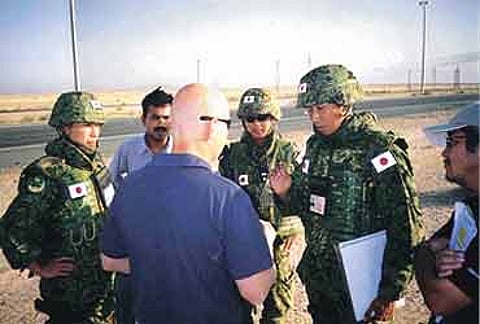
While the KBR and PWC convoys and those supplying goods to the Japanese, Italian and Dutch military bases are protected by their respective militaries, civilian convoys depend on private Iraqi security—a bunch of poorly-trained youngsters. Mahboob bemoans, "If the guard had fired the gun, at least the gunman would have known that there is security. But my guard ducked. I also got a poor guard. The better guards sit only in trucks with good air-conditioning and cassette players. I did not have good air-conditioning in my truck, so I got a lousy guard." Agrees Jagjit Singh Sandhu, supervisor with Celedon, and earlier with KBR, "At times, when we come under fire, the guards run away. The worst part is that they sometimes travel too fast for the convoys, driving a kilometre ahead."
In contrast, private British security companies get a thumbs up from almost all drivers. Employed by private parties, and sometimes even by the militaries, they travel in SUVs dispersed through a convoy. Says Jacob, "We trust British security. They are patient and take care of us better than anybody else."
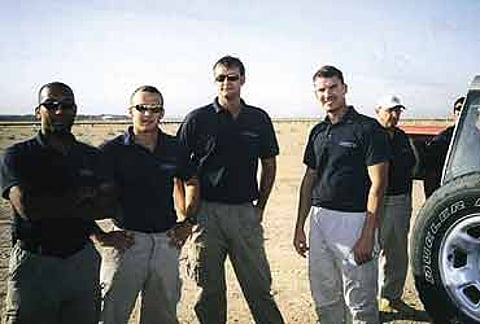
The British security groups themselves comprise mostly former British commandos. Says Mike Jones-Mathias, operations director for Securiforce International, "Our objective is just to keep the convoys moving. If we slow down, we become targets. The other thing we like to avoid is to get traffic alongside the trucks." Adds former warrant officer Andy, "Though the situation is starting to get a little better because the Americans are retreating to their bases, I think there will be an upsurge of violence. The Iraqi security can't suddenly fill in the vacuum left by the American forces."
The situation was quite normal for the trucking convoys before April. Says Daljit Singh, 25, from Gurdaspur, who drives for Jassim, "Till four months back they only threw stones at us."
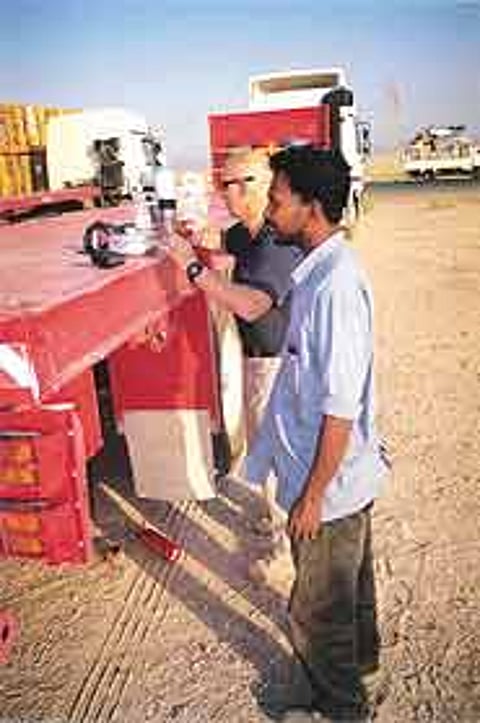
The drivers aren't the only Indians working in Iraq. There are cooks and kitchen-helpers on American bases, some of which are located in very hostile territory. Says George Kutty V. John, managing director of Vigy Group of companies, "When I was in the Mosul camp, two-three bomb blasts took place at the gate of the camp, killing the guards. There were also incidents of grenade-throwing inside the camp." George Kutty has been involved with Rajan Daniel, whose Kuwaiti company won a labour contract in Mosul for 15 months and now employs about 160 Indians there. He adds carefully, "There's no compulsion to work at the camps."
The lure of money is sufficient. While kitchen-helpers get $300 (about Rs 13,800) per month, cooks earn around $750 (about Rs 34,500) a month and chief cooks as much as $1,500 (about Rs 69,000). The camp personnel get one month of paid leave for every six months of work. But, understandably, for their own security, they can't step outside the camps.
The earnings of convoy drivers vary considerably. At the top of the heap are drivers of KBR convoys. Says Harjeet Singh, "For 12 hours of work a day, we get $1,200 (about Rs 55,200) a month; for every extra hour we get $3.On an average, we end up earning about $1,700 (about Rs 78,200) a month. That's more than 10 times of what we would earn in India." At the bottom are companies like Jassim, which pay a measly $6 a day for every day in Kuwait but $30 a day for every day in Iraq. Such drivers manage about $450 (about Rs 20,700) a month. Drivers in PWC are in the middle. Says Pradeep, 32, a PWC driver, "We get $450 a month plus $60 for every trip into Iraq. In a month, we manage to make three-four trips." For most drivers, the insurance premia come from their pay packets.
Incidentally, KBR has also been tasked by the US military to increase oil production in several Iraqi oil-fields. In one of them, in south Romella near Basra, KBR has subcontracted the work to Al Meer Technical Services Co, an Indian-owned company based in Kuwait. The Indians who dominate the company's workforce shuttle daily between Kuwait and Basra, escorted by 16 marksmen in SUVs and pick-up trucks. Says Gulam Mustafa, the Iraqi project manager at Al Meer, "We take 40 to 110 people daily into Iraq. But nobody stays there after sunset. We have contracted a private US security firm to provide us protection." The security tab picked up by KBR: $5,000 a day.
Al Meer itself has a long-term policy in Iraq. Says Mustafa, "We employ about 120 Iraqis. We give them overtime, travel allowances and have initiated a training programme for their engineers. Iraqi technicians in the oil-fields are not familiar with electronic instrumentation." No wonder, the company has struck a more than cordial relationship with the locals. (There are also other companies here like Kamani Steel of Mumbai which are working on overhead electrical transmission projects.)
The goodwill that Al Meer is earning is also because the Iraqis are generally well-disposed towards Indians, the current kidnapping notwithstanding. Says Sukhchain Singh, 40, from Kapurthala, a driver with Jassim, "In April this year, we were attacked about a 100 km from the Kuwait border. But once the mujahideen found out we were Indians, they didn't kill us. They were only interested in snatching our vehicles." Or take driver Jattu Ram from Punjab. Part of one of the convoys, his appendix acted up in March this year. The doctors in Baghdad operated upon him free once they came to know he was Indian. "I had no money. They gave me free medicines and food. I was saved by them," he recalls.
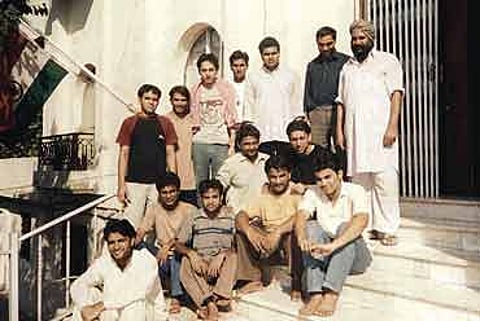
As if the madness on the highway isn't enough for the Indians, they invent some on their own. For the last fortnight, a group of 14 Indians has been boarding at the Indian embassy in Baghdad, after they were plucked out of jail near Mosul where they had been incarcerated for over six weeks. Says ambassador Tyagi, "They were lured by agents with promises of jobs in Greece. Instead, they were shoved into Iraq from Jordan. The logic was that it would be easier to cross over from Iraq into Turkey and Syria and then to Lebanon or Greece." Says Jaswant Singh, 26, from Jalandhar, "We were not supposed to come to Iraq at all. But once we crossed over into Syria, our agent deserted us. Local farmers spotted us and informed the police."
The Syrian police took their money and belongings and pushed them into Iraq, where the Iraqi border police apprehended them. For 12 days, they languished in the locker, surviving on little food and water. Says Tyagi, "The Iraqi police thought they were foreign terrorists, and an Iraqi court subsequently sentenced them to jail for one year. We met the judge and secured their release on a guarantee that they would be sent back to India." With no direct flights between Iraq and India, the group is waiting for visas from either Jordan or Iran to transit to India.
This isn't the first group the embassy has rescued from Iraqi jail.It has, in the last seven months, bailed out three other groups—two of 10 each and one of 26.Says Tyagi, "Sometimes you can't help but admire their spirit.Out of the 60-odd that we have rescued from Iraqi jails over one year, at least four were repeat visitors and willing to take the risks twice over."
Equally amazing is the story of Indians in Najaf, the spiritual centre of the Shias, where one of the four principal ayatollahs is Ayatollah Sheikh Bashir Hussain Najafi. Born in Jalandhar, Sheikh Bashir studied in Lahore before shifting to Najaf 40 years ago. Since then, he hasn't visited the subcontinent even once. Out of 160 students from South Asia studying Islam under him, there are two dozen Indians—from Kargil, Mumbai, Allahabad, Haridwar and Azamgarh—who wrote admission tests and qualified to study in the Hussainiya Shirazia here. They have a punishing 18-hour schedule and subsist on a monthly scholarship of $80.
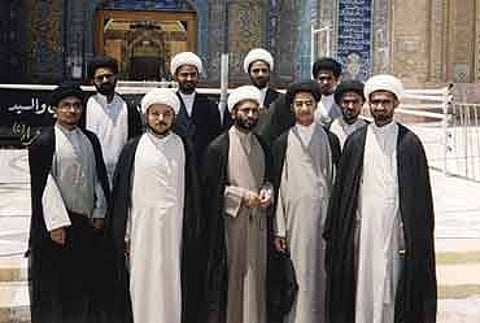
Says Syed Ghulam Askari, 26, from Allahabad, "Four of us came when Saddam was still around. We were here right in the middle of the war. We saw the fire fights in Najaf, the helicopters firing missiles." These students are perturbed by the kidnapping of the three Indian truckers. Says Mohammad Ali Shakiri, "Kidnapping and beheadings are not part of Islam. We hope the drivers are released without harm."
Ayatollah Bashir, however, is ambiguous about whether militants are justified in attacking trucking convoys and kidnapping drivers. Explains the cleric, "The first point is that terrorists are fighting the US and their proxies. By attacking their supply convoys, they're hurting the US. In jang (war) anything goes. If India and China were at war, would the Indians allow civilians of a third country to take water to the Chinese troops? It's the same here. The second point is that both are wrong."
Probed about Islamic militancy, of the kind represented by Al Qaeda globally and by Jordanian-born Abu Musab al Zarqawi in Iraq, the ayatollah says, "How can they represent Islam? Do you want to ask about Islam from somebody who has been researching it for 40-50 years or someone who is using it for getting a chair?" He, however, justifies the silence of clerics like him on militant Islam, "If we issue a fatwa against Islamic militancy, it will be considered a siyasi (political) act. Osama will come after us then."
The fear of militants is palpable here. For instance, Ayatollah Bashir lives in a house adjacent to the building where he takes classes, and moves between the two places via the roof, flanked by gunmen. The fear of militant groups has dissuaded him from stepping out on the streets.
The militia of the firebrand Shia leader, Moqtada al-Sadr, is vocal in its opposition to the kidnapping. Moqtada al-Sadr himself condemned the kidnappings, indirectly, at a Friday prayer in Najaf. But some of his followers draw a rather delicate distinction. Says Sheikh Ahmad Khafachi, 29, a close aide of Moqtada and who spent three years in jail under the Saddam regime, "The militants are fighting the Americans and hurting their convoys out of love for Saddam. But we are fighting the Americans out of love for Islam."
Bustling with hundreds of fighters eager to test their manhood against the US, and with clerics who talk loose and fast, Indian truckers in Iraq, particularly the three kept hostages, can only keep their fingers crossed.
(The writer is the editor of Cobrapost.com.)
Tags